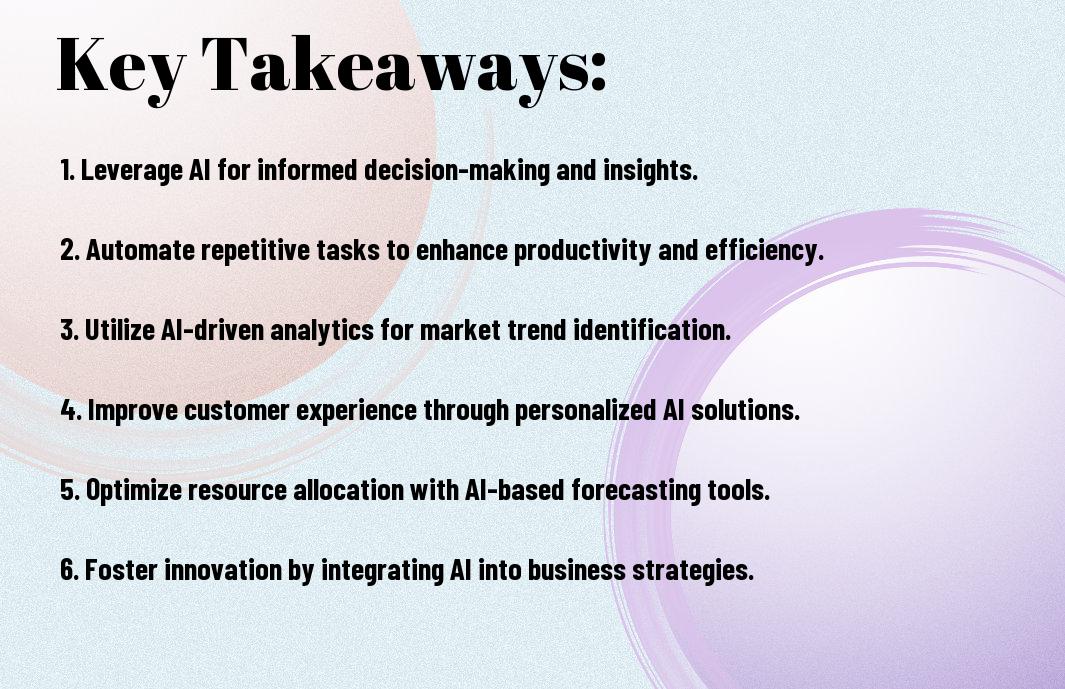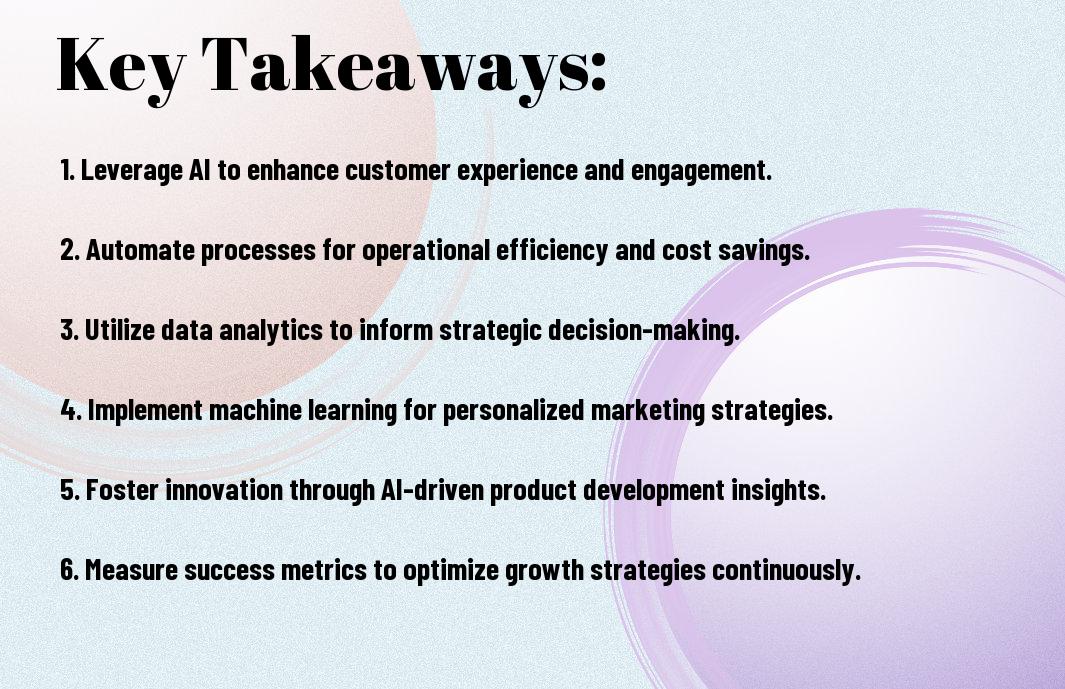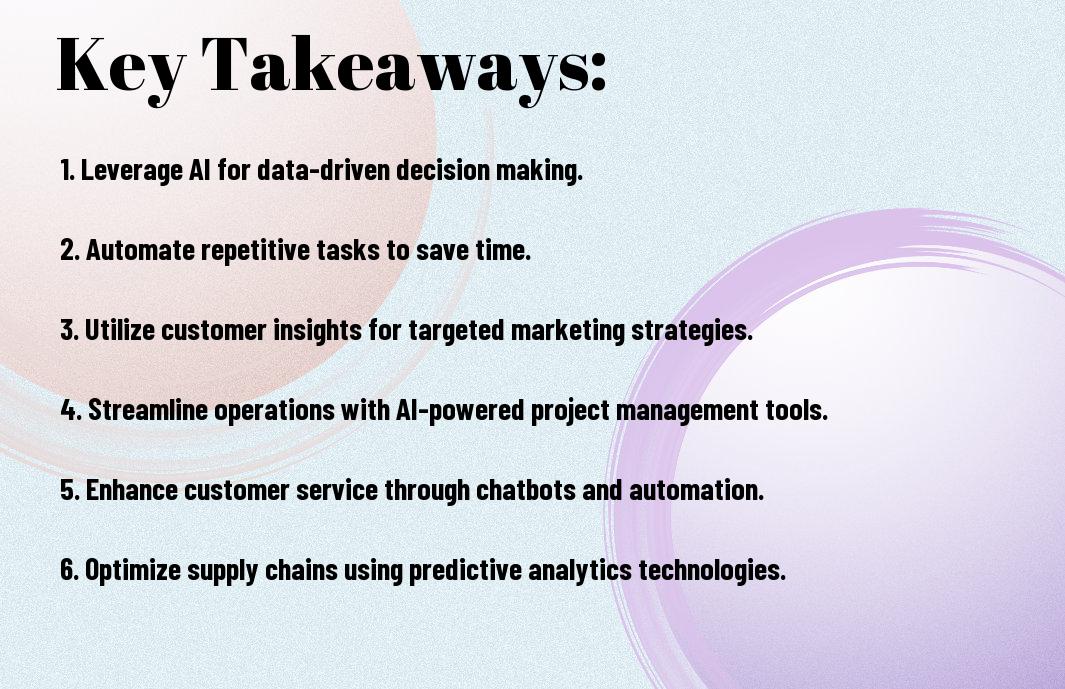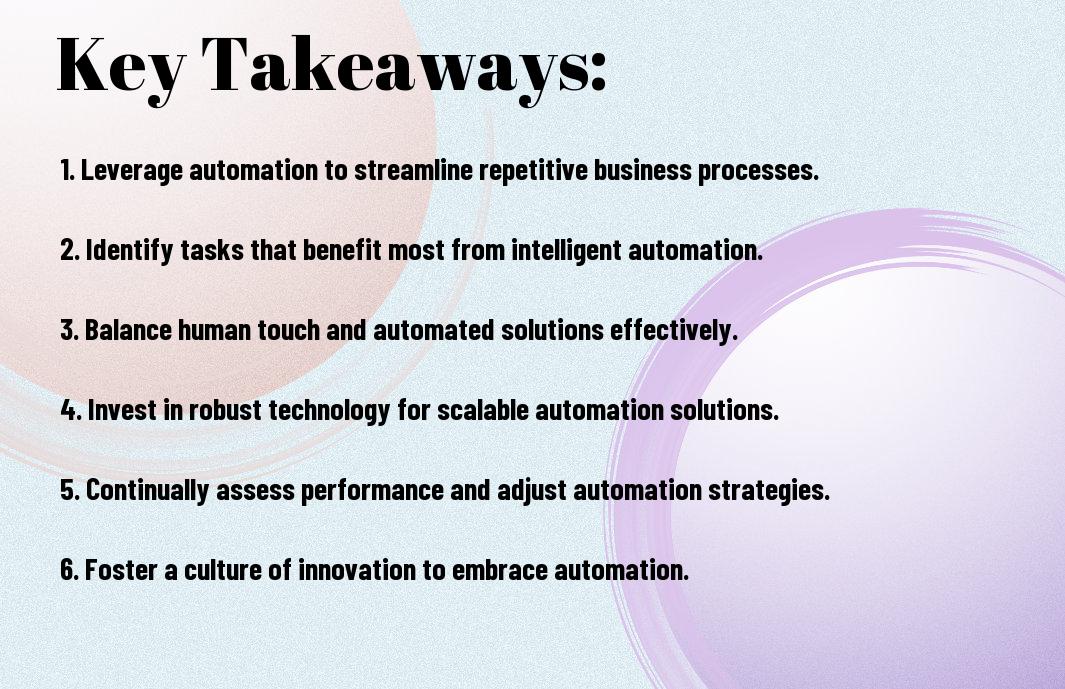As you navigate the complexities of growing your business, you’re likely exploring ways to leverage artificial intelligence (AI) for exponential growth. You can learn from experts who have successfully implemented AI solutions, such as those discussed in Scaling enterprise AI for business value, to inform your strategy. By understanding how to effectively integrate AI into your operations, you can unlock new efficiencies, drive innovation, and stay ahead of the competition, ultimately achieving your entrepreneurial goals.

Key Takeaways:
- Implementing AI solutions can significantly enhance business efficiency and productivity, allowing entrepreneurs to streamline operations, automate tasks, and make data-driven decisions to drive growth and expansion.
- A well-planned AI integration strategy is vital for entrepreneurial success, involving the identification of areas where AI can add value, the development of a tailored implementation roadmap, and the establishment of key performance indicators to measure progress.
- By leveraging AI technologies, businesses can unlock new opportunities for innovation and scalability, enabling them to stay competitive in a rapidly evolving market landscape and achieve long-term sustainability and success.
The Tipping Point of AI in Business
Your business is on the cusp of a revolution with AI, and understanding its potential is key to unlocking growth and success. As you navigate this new landscape, you’ll discover how AI can transform your operations and propel you forward.
Identifying AI-Ready Operations
For instance, you’ll need to assess your current processes and identify areas where AI can have the most impact, streamlining your workflow and enhancing productivity. By doing so, you’ll be able to make informed decisions about where to implement AI solutions.
The Small Changes That Make Big Differences
Differing from traditional approaches, AI-driven solutions can bring about significant improvements with minimal adjustments, allowing you to test and refine your strategies. You’ll find that even small changes can have a profound effect on your business.
The key to leveraging these small changes is to focus on high-impact areas, such as customer service or supply chain management, where AI can help you optimize processes and improve efficiency. As you implement these changes, you’ll begin to see the benefits of AI firsthand, and you can continue to build upon these successes to drive further growth and innovation in your business.
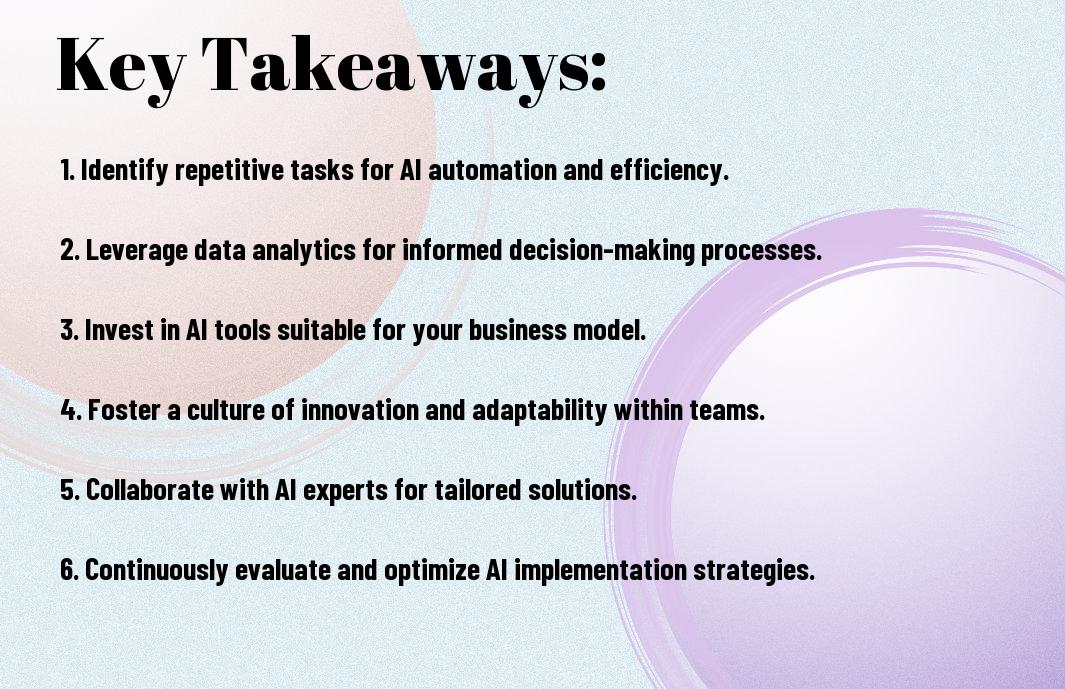
AI Implementation Strategy
If you’re looking to scale your business with AI, developing a comprehensive implementation strategy is imperative. You’ll need to assess your current infrastructure, identify areas for improvement, and determine which AI solutions will have the greatest impact on your operations.
Low-Hanging Fruit vs. Transformative Projects
By prioritizing projects that offer the quickest returns, you can build momentum and establish a strong foundation for future AI initiatives. You’ll need to weigh the benefits of tackling low-hanging fruit against the potential of more transformative projects that may require greater investment.
Building Your AI Ecosystem
Strategically, you’ll want to focus on creating a cohesive AI ecosystem that integrates with your existing systems and processes. You’ll need to consider the roles and responsibilities of various stakeholders, as well as the technical requirements for implementing and maintaining AI solutions.
Even as you begin to build your AI ecosystem, you’ll want to keep your long-term goals in mind, considering how each new implementation will contribute to your overall vision for AI-driven growth and innovation, and how you can continually evaluate and refine your approach to ensure maximum ROI and impact on your business.
Data as Your Business Currency
Many businesses today are recognizing the value of data in driving growth and informed decision-making. You need to understand how to harness your data to unlock new opportunities and stay ahead of the competition. Your ability to collect, analyze, and act on data will be the key to your success.
Creating Data Collection Systems
Besides having a solid business strategy, you need to establish effective data collection systems to gather relevant information about your customers, operations, and market trends. You should identify the types of data that are most relevant to your business and develop systems to collect and store this data securely.
Turning Raw Data into Business Intelligence
Any successful business relies on its ability to turn raw data into actionable insights. You can achieve this by investing in analytics tools and techniques that help you to extract meaningful patterns and trends from your data, enabling you to make informed decisions about your business.
In addition, as you research deeper into turning raw data into business intelligence, you will discover that it involves not only the use of technology but also the development of a data-driven culture within your organization. You will need to ensure that your team is equipped with the skills to analyze and interpret data, and that data insights are integrated into your decision-making processes to drive business outcomes.
Automation and Workforce Evolution
Unlike traditional methods, AI-driven automation enables you to streamline your business operations, enhancing efficiency and productivity. As you integrate AI, your workforce will undergo a significant evolution, requiring you to reassess tasks, jobs, and skills.
Tasks vs. Jobs: What to Automate
Before automating, you need to identify tasks that can be optimized with AI, distinguishing between tasks that can be automated and jobs that require human expertise, allowing you to make informed decisions about your workforce.
Reskilling for the AI-Augmented Workplace
Among the key considerations for your business is preparing your workforce for an AI-driven environment, where you will need to reskill and upskill your employees to work effectively with AI systems, ensuring they can leverage AI capabilities to enhance their productivity.
AIAugmented workplaces require you to invest in your employees’ development, providing them with the necessary training and resources to work alongside AI systems, enabling you to unlock the full potential of AI and achieve greater efficiency, innovation, and growth in your business, as you navigate the evolving landscape of work and technology, you will be able to position your business for long-term success.
Customer Experience Enhancement
Keep your customers at the forefront of your business by leveraging AI to enhance their experience, as outlined in AI for Entrepreneurs: A Roadmap for Success, to drive loyalty and growth.
Personalization at Scale
By utilizing AI-powered tools, you can tailor your customer interactions to meet individual needs, fostering a sense of connection and increasing satisfaction with your brand.
Predictive Customer Service
By anticipating customer inquiries and concerns, you can proactively address issues, reducing wait times and improving overall experience.
Hence, as you implement predictive customer service, you will be able to analyze customer data and behavior, identifying patterns and potential pain points, allowing you to develop targeted solutions and improve your support services, ultimately leading to increased customer loyalty and retention, and driving long-term growth for your business.
Measuring AI ROI
Once again, you’ll need to assess the financial impact of AI on your business, but this time with a focus on return on investment (ROI). You must evaluate how AI solutions generate revenue, reduce costs, and improve efficiency to make informed decisions about your AI strategy.
Beyond Cost Savings: New Value Metrics
Saving time and resources is just the beginning; you should also consider new value metrics such as customer satisfaction, employee productivity, and innovation. You can use these metrics to measure the effectiveness of your AI solutions and identify areas for improvement.
Iterative Implementation and Adjustment
For your AI implementation to be successful, you need to adopt an iterative approach, continuously monitoring and adjusting your strategy as you gather more data and insights. You should be prepared to make changes and adaptations to ensure your AI solutions meet your evolving business needs.
Further, as you refine your AI strategy, you’ll need to stay flexible and open to new opportunities and challenges. You should regularly assess your AI solutions’ performance, gather feedback from stakeholders, and make data-driven decisions to optimize your AI investments and maximize your ROI. This iterative process will help you unlock the full potential of AI and drive long-term success for your business.
Conclusion
So, as you launch on scaling your business with AI, you will unlock new opportunities for growth and efficiency. You will be able to automate tasks, gain valuable insights, and make data-driven decisions to drive your business forward. By following a well-planned roadmap, you can harness the power of AI to achieve your entrepreneurial goals and stay ahead of the competition, ultimately leading your business to success.
FAQ
Q: What is the role of AI in scaling a business, and how can entrepreneurs leverage it for success?
A: Artificial intelligence (AI) plays a significant role in scaling a business by automating processes, enhancing decision-making, and improving operational efficiency. Entrepreneurs can leverage AI by integrating it into their business strategy, using tools such as machine learning algorithms, natural language processing, and predictive analytics to drive growth, reduce costs, and gain a competitive edge in the market.
Q: How can entrepreneurs determine which areas of their business can benefit from AI implementation, and what are the key considerations for successful integration?
A: Entrepreneurs can identify areas that can benefit from AI by assessing their business operations, identifying pain points, and evaluating opportunities for automation and process improvement. Key considerations for successful integration include defining clear goals and objectives, selecting the right AI technologies, ensuring data quality and availability, and developing a robust implementation plan that addresses potential risks and challenges.
Q: What are the potential risks and challenges associated with scaling a business using AI, and how can entrepreneurs mitigate them?
A: The potential risks and challenges associated with scaling a business using AI include data privacy and security concerns, job displacement, and the need for significant upfront investment in technology and talent. Entrepreneurs can mitigate these risks by implementing robust data governance policies, investing in employee retraining and upskilling, and adopting a phased approach to AI implementation that allows for testing, evaluation, and refinement of AI systems.
Q: How can entrepreneurs measure the effectiveness of AI in driving business growth and scaling, and what are the key performance indicators (KPIs) to track?
A: Entrepreneurs can measure the effectiveness of AI in driving business growth and scaling by tracking KPIs such as revenue growth, customer acquisition and retention rates, operational efficiency gains, and return on investment (ROI). Additional KPIs to track include AI system accuracy and reliability, data quality and availability, and employee adoption and engagement with AI technologies.
Q: What are the future trends and developments in AI that entrepreneurs should be aware of, and how can they stay ahead of the curve in terms of AI adoption and innovation?
A: Future trends and developments in AI include the increasing use of edge AI, explainable AI, and human-AI collaboration. Entrepreneurs can stay ahead of the curve by staying informed about the latest AI research and breakthroughs, participating in industry conferences and workshops, and investing in ongoing education and training for themselves and their employees. Additionally, entrepreneurs should prioritize building a culture of innovation and experimentation within their organization, encouraging experimentation and risk-taking in AI adoption and development.



